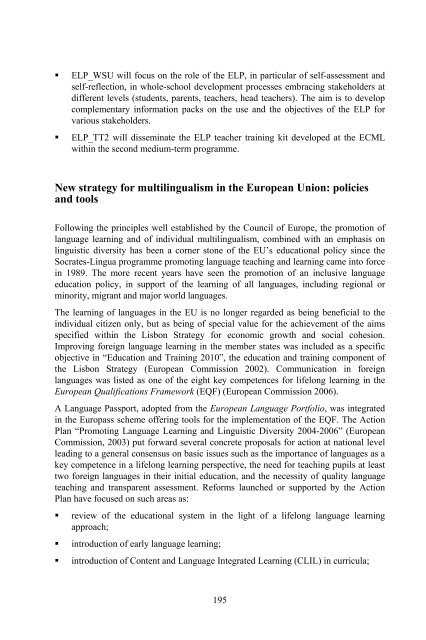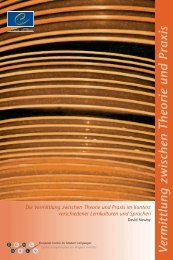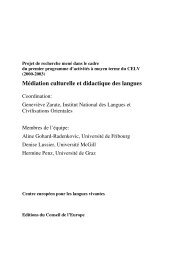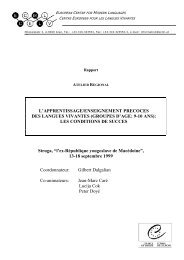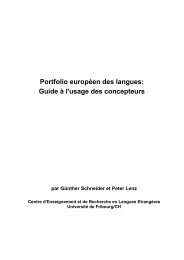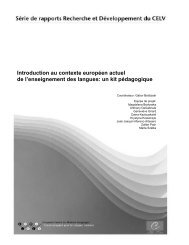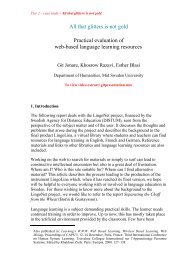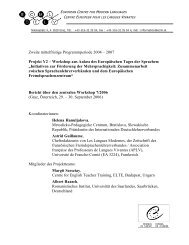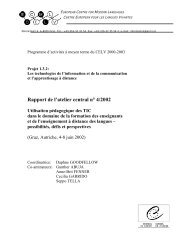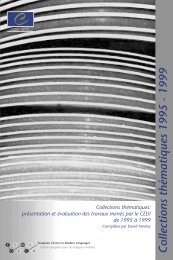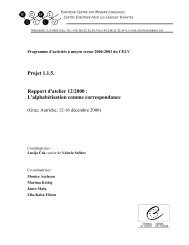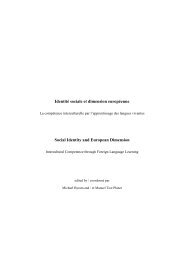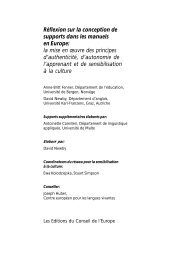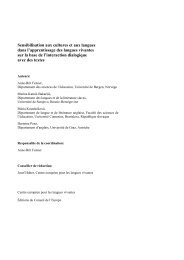cohesion - European Centre for Modern Languages
cohesion - European Centre for Modern Languages
cohesion - European Centre for Modern Languages
Create successful ePaper yourself
Turn your PDF publications into a flip-book with our unique Google optimized e-Paper software.
ELP_WSU will focus on the role of the ELP, in particular of self-assessment and<br />
self-reflection, in whole-school development processes embracing stakeholders at<br />
different levels (students, parents, teachers, head teachers). The aim is to develop<br />
complementary in<strong>for</strong>mation packs on the use and the objectives of the ELP <strong>for</strong><br />
various stakeholders.<br />
ELP_TT2 will disseminate the ELP teacher training kit developed at the ECML<br />
within the second medium-term programme.<br />
New strategy <strong>for</strong> multilingualism in the <strong>European</strong> Union: policies<br />
and tools<br />
Following the principles well established by the Council of Europe, the promotion of<br />
language learning and of individual multilingualism, combined with an emphasis on<br />
linguistic diversity has been a corner stone of the EU’s educational policy since the<br />
Socrates-Lingua programme promoting language teaching and learning came into <strong>for</strong>ce<br />
in 1989. The more recent years have seen the promotion of an inclusive language<br />
education policy, in support of the learning of all languages, including regional or<br />
minority, migrant and major world languages.<br />
The learning of languages in the EU is no longer regarded as being beneficial to the<br />
individual citizen only, but as being of special value <strong>for</strong> the achievement of the aims<br />
specified within the Lisbon Strategy <strong>for</strong> economic growth and social <strong>cohesion</strong>.<br />
Improving <strong>for</strong>eign language learning in the member states was included as a specific<br />
objective in “Education and Training 2010”, the education and training component of<br />
the Lisbon Strategy (<strong>European</strong> Commission 2002). Communication in <strong>for</strong>eign<br />
languages was listed as one of the eight key competences <strong>for</strong> lifelong learning in the<br />
<strong>European</strong> Qualifications Framework (EQF) (<strong>European</strong> Commission 2006).<br />
A Language Passport, adopted from the <strong>European</strong> Language Portfolio, was integrated<br />
in the Europass scheme offering tools <strong>for</strong> the implementation of the EQF. The Action<br />
Plan “Promoting Language Learning and Linguistic Diversity 2004-2006” (<strong>European</strong><br />
Commission, 2003) put <strong>for</strong>ward several concrete proposals <strong>for</strong> action at national level<br />
leading to a general consensus on basic issues such as the importance of languages as a<br />
key competence in a lifelong learning perspective, the need <strong>for</strong> teaching pupils at least<br />
two <strong>for</strong>eign languages in their initial education, and the necessity of quality language<br />
teaching and transparent assessment. Re<strong>for</strong>ms launched or supported by the Action<br />
Plan have focused on such areas as:<br />
review of the educational system in the light of a lifelong language learning<br />
approach;<br />
introduction of early language learning;<br />
introduction of Content and Language Integrated Learning (CLIL) in curricula;<br />
195


